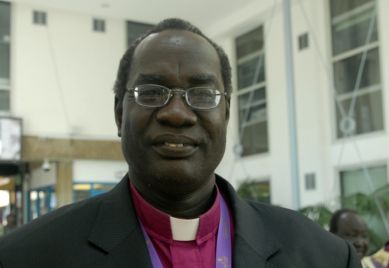South Sudan Report Shows Churches' Role in Education, Peacebuilding

Amid an ongoing oil dispute between South Sudan and Sudan and an outbreak of tribal violence in South Sudan in recent months, Churches in the south will continue to play a role in seeking peace and have the capacity to contribute to education efforts such as school construction, according to a UK report on prospects for peace and development in the country.
An Anglican Alliance official says a new UK progress report which includes a review of the government's efforts and that of churches in newly created South Sudan shows "powerful and welcome evidence" of the Episcopal Church in Sudan's role in peace building and education.
The report released last Thursday by a committee of Ministers of Parliament outlines the "Prospects for Peace and Development" in South Sudan amid the risk of financial and humanitarian difficulties facing South Sudan.
Disputes between tribes in the south have resulted in violence in recent months while Sudan and South Sudan relations remain tense amid armed disputes over oil. Testimony in the report notes outbreaks of violence between the Lou Nuer and Murle communities have claimed the lives of between 600 and 1,000 people in recent months.
The report notes a long history of violent conflicts between tribes, clans and subclans in the state of Jonglei caused by cattle-raiding and competition for resources including food, land and water. That has been exacerbated in recent years by the supply of arms and activities of rebel militia groups, the report notes.
Violence flared up most recently starting in the period between Christmas and New Year by an attack on Murle communities in Pibor county in Jonglei State by thousands of heavily armed members of the predominantly Lou Nuer militia. The latest cycle of violence dates back to 2009 as the nature of attacks began to escalate, the report states. Retaliatory attacks by Murle groups have also been reported.
"This report must be seen against the backdrop of the continuing insecurity in South Sudan," said Anglican Alliance director Sally Keeble in a statement. "It provides powerful and welcome evidence of the role of the Church in peace-building and education."
She noted the work of representatives from the Episcopal Church of Sudan and the Diocese of Salisbury.
"Rebecca Coleman and Canon Woodward gave persuasive evidence to the select committee which has accepted their key witness of the importance of the Church's role in South Sudan," Keeble added. "The submission of written and oral evidence by partners in the UK and Sudan also demonstrated how effective Anglicans can be in coordinated advocacy across the Communion."
School Construction
The report, which looks at both short and long term prospects also described the UK government's funding decisions through its Department for International Development and Foreign Commonwealth Office, says the church has some capacity to help in the construction of schools.
"We are concerned, however, that DFID's decision to fund the United Nations rather than the Episcopal Church of Sudan to deliver its school construction program misses an opportunity to strengthen and complement the limited internal capacity that already exists within South Sudan," the report states.
Authors of the report cited testimony by Coleman.
"They told us that the ECS had a good record of constructing schools cheaply and to a high standard," the report states.
Coleman is cited as saying that the Church could construct an eight-classroom school within two months for 40,000 pounds.
The report states that the DFID Minister Stephen O'Brien chose the UN "given the scale of the project and the need for rapid completion on time and with value for money."
While the Episcopal Church of Sudan had constructed 90 classrooms in 22 schools over five years, the DFID required 200 classrooms in about 25 schools in one year.
"The costs between the two bids were also said to be broadly similar," the report states.
The church would continue to play a "very critical" role in the education sector, for instance in the DFID's Girls' Education program.
Peace Building Process
The report also noted the role of the Sudan Council of Churches (SCC) – a group of six churches in Southern Sudan – which "played an important peacebuilding and mediation role during the 22 years of civil war in South Sudan and the Comprehensive Peace Agreement period."
It noted that Archbishop Daniel Deng of South Sudan has been "heavily involved" in mediation efforts between tribes, "particularly in Jonglei State." The state is one of the largest and most populated states in South Sudan.
The Episcopal Church of Sudan and its UK partners say that churches "continue to maintain the confidence of the people" and would work as a "strong and complementary" actor in the peace process.
The statement came as a response to an analysis by the DFID stating that that Church "could not deliver" on a peace resolution in the way it was being asked.
The report stated that DFID, which allocated 250,000 pounds to the SCC in 2012 to facilitate peace by focusing on disarmament amongst rural people, suggested that recent Jonglei attacks had seen the "break down of the peace process being led by Archbishop Deng and the SCC."
In the future, the SCC's role would take shape "most likely as part of a 'twin track' approach led by the Government of South Sudan."
"The thing that has changed is that previously the Church was given a role, or asked to play a role, by the Government that was perhaps unreasonable. The Church could not deliver that kind of peace resolution process in the way that it was being asked on its own," said mark Mallalieu, Head of DFID South Sudan, according to the report.
The Church said that the Government of South Sudan and Sudan People's Liberation Army had been slow to respond to church leaders' repeated requests, from as early as September 2011, to deploy troops to protect civilians when attacks in Jonglei were anticipated.